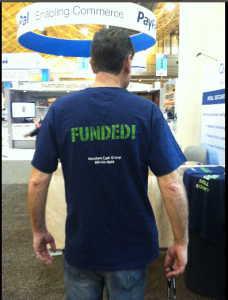Merchant Processing
Google Penguin 2.0 Hits Search Rankings – Track The Responses
May 23, 2013According to Google’s Matt Cutts, Google Penguin 2.0 was fully implemented on Wednesday afternoon. Notice a difference in the search queries today? We’re noticing a lot of activity in the MCA industry. Using a nice little hack, we’ve created a way to track all the responses on Google+ that are specifically tied to Matt Cutt’s blog announcement. See what’s being said below:
ETA Expo Recap
May 3, 2013 Recap of the ETA Expo as it pertains to Merchant Cash Advance:
Recap of the ETA Expo as it pertains to Merchant Cash Advance:
- Just about every funder has an ACH program or is working on implementing one.
- Many funders are licensed lenders or are working to become licensed in the states where it may be necessary. There actually seemed to be a lot of excitement about this. Funders are finding comfort in being subject to state mandated regulations as it probably raises their legitimacy and it will make their businesses easier to value when trying to raise money or sell.
- The ACH repayment market will be larger than the split-funding market this year. There’s no doubt in my mind about this. That means that ACH funding is now the primary protocol behind Merchant Cash Advance.
- Almost everyone is working hard to build up their technology. I got a personal demo of RetailCapital’s ISO/Agent system in addition to Capital Access Network’s new CapTap. Both are great. Capital Stack also has a beautiful platform.
- Stacking is the issue of 2013 as I heard that word uttered probably every 30 seconds for a whole week. I know the NAMAA folks are talking about it but I don’t know what the consensus is. It’s important to keep in mind that many funders aren’t NAMAA members and that affects NAMAA’s ability to dictate policy. Capital Access Network, the largest funder in the industry isn’t even a member.
- Speaking of NAMAA, they refaced their website and it looks A LOT better. I see only 14 members listed but it’s my understanding that there are closer to 20 of them.
- Factor rates are all over the place. Swift Capital has a new 1.099 program, which has got to be the first one to fall under the 10% threshold aside from Amex’s Merchant Financing. Higher risk deals however still operate in the 1.49 and up range. There is no one-size-fits-all product anymore.
- There were several direct lenders walking around that I had never heard of and they are apparently doing significant monthly volume. More and more people are getting into the funding business.
- It’s exhausting trying to keep up with the news surrounding On Deck Capital. They are on a very deliberate path and what we keeping seeing and hearing is them just checking things off on their to-do list. I bullet-pointed my theory on DailyFunder in response to a few posts.
- Discover and Priority Payments threw great parties.
- New Orleans has a lot of charm.
Make sure to check out my updates and photos that I’ve finally posted from the ETA Expo on DailyFunder and feel free to add your own if you were there.
Dozens of photos from the show
Also read: Soul Mates: Merchant Cash Advance and Silicon Valley VCs
Follow us at the ETA Expo
April 30, 2013May 3, 1:00am: I underestimated how easy it would be to make frequent updates. Wednesday was fantastic. I uploaded a couple dozen photos and updates all at once earlier today over on DailyFunder. As soon as the show was over, I found myself on Bourbon Street at the Discover party followed by the Priority Payments party. Both were a great time.
My Recap of the show is up now: ETA Expo Recap
Soul Mates: Merchant Cash Advance and Silicon Valley VCs
Original story about On Deck Capital’s investment from Google Ventures and Peter Thiel
My theory on why On Deck Capital took a paltry $17 million from Google Ventures and Peter Thiel
Photos and updates from the ETA
————————————–
May 1, 1:00am: Great start to the show this evening. Merchant Cash Advance providers and alternative business lenders continue to have a very strong presence in the payments industry. The booths I saw include: RetailCapital, NextWave Funding, Merchant Cash Group, On Deck Capital, Capital Access Network, Strategic Funding Source, American Finance Solutions, Swift Capital, MotherFund, and Principis Capital. GRP Funding and Paramount Merchant Funding are also on the exhibitor list but I didn’t spot their booths yet. That’s pretty substantial and it omits the major presence of Merchant Cash Advance companies that aren’t exhibiting. I bumped into Merchant Cash and Capital and walked the floor a bit with David Rubin of Capital Stack.
I met the guys behind Super G Funding which lends money against residuals. They’re great guys and they have such a unique role in the industry.
I think every funder I spoke with was quick to mention that they do 12 month deals and either offer direct debit repayment or will have it soon. The ACH train has disrupted the split-funding market pretty severely though many funders continue to do big numbers via split.
Nobody seemed to have an appetite for low FICO score deals (500s and below) except for Merchant Cash Group and Capital Stack which target the higher risk market intentionally. And when I say “don’t have an appetite for,” I literally mean when asking a funder if they do below 500 credit, the answer is some version of “HECK NO!!”
Overall tone, and perhaps its because opening night included open bar, but it was very optimistic. Most funders seemed intent on expanding and are eager to service as much business as possible. I definitely get that sense that there is a real focus these days on the bigger fish ISOs ($1 million+ in referral business a month). When newbie brokers enter the space, funders spend an enormous amount of resources developing them and many times they just don’t pan out. Either the brokers don’t have the capacity to do more than a handful of deals, or they just don’t “get it.”
If you’re a mom and pop ISO and you have just 1 or 2 deals a month, it’s more difficult these days to get time and attention from a funder. Capital is flooding into the industry and everybody wants partners that can produce volume. From a resource standpoint, the “1 and done” reps are not an efficient use of time.
Big ISOs have a lot of negotiating power at their disposal these days. In the last 7 years, it was good to be an ISO, then hard to be an ISO and now it’s good again. Many things in MCA have a weird way of going full circle. Hope to see you on Wednesday.
————————————–
Apr 30, 1:00am:  Merchant Processing Resource will be publishing updates as often as we can from the ETA Expo in New Orleans. I am very excited to be down here. Earlier today I had the opportunity to eat beignets at Cafe Du Monde, visit the French Market District, and take a ride on the Natchez Steamboat on the Mississippi River. But starting Tuesday, it’s all business. A schedule of events can be found on the ETA’s website.
Merchant Processing Resource will be publishing updates as often as we can from the ETA Expo in New Orleans. I am very excited to be down here. Earlier today I had the opportunity to eat beignets at Cafe Du Monde, visit the French Market District, and take a ride on the Natchez Steamboat on the Mississippi River. But starting Tuesday, it’s all business. A schedule of events can be found on the ETA’s website.
You can follow along with everyone else in town on twitter using #ETAExpo2013 or #ETAExpo13
and of course via the DailyFunder Merchant Cash Advance iPhone App.
Some pre-conference tweets:
ETA Expo 2013 on Twitter
pre-conference tweets
Storified by Sean M· Mon, Apr 29 2013 22:21:50
Here’s to learning, networking, and having fun!
– Merchant Processing Resource
https://debanked.com
It Got Said – Merchant Cash Advance – Friday Fun
April 26, 2013In honor of Friday, we’re having some fun…


Caught on twitter
And Also
Business Financial Services landed an $82 million credit line
A third industry captain will be joining DailyFunder’s CEO Corner early next week at the ETA Expo. Stay tuned! Read articles put out by two other MCA CEOs.
Sean of Merchant Processing Resource and the DailyFunder co-founders will be on the trade show floor of the ETA Expo next week. Considerable time will be spent at Merchant Cash Group‘s exhibit at booth #751 and a guest appearance at Strategic Funding Source‘s booth at #916. We’d love to see you there. Make sure you download the DailyFunder iPhone app as we will try to maintain a live blog of the events.
ETA Expo 2013 is Approaching
April 9, 2013 The ETA Expo 2013 in New Orleans is fast approaching. If you haven’t registered yet, you should probably go and do that over at http://www2.electran.org/am13/. This will personally be my first time to New Orleans and I am excited to meet and speak with a lot of you. Merchant Processing Resource and DailyFunder will be running a live blog to cover the happenings both big and small each day. So if you’ve got an iPhone and you haven’t downloaded the app yet, now is a good time to go and do that so that you can follow along.
The ETA Expo 2013 in New Orleans is fast approaching. If you haven’t registered yet, you should probably go and do that over at http://www2.electran.org/am13/. This will personally be my first time to New Orleans and I am excited to meet and speak with a lot of you. Merchant Processing Resource and DailyFunder will be running a live blog to cover the happenings both big and small each day. So if you’ve got an iPhone and you haven’t downloaded the app yet, now is a good time to go and do that so that you can follow along.
David Rubin, a co-founder of DailyFunder will also be on site and we plan on having some fun giveaways.
So don’t forget plan your meet-ups, what to do, and who to see before you arrive. Talk about it on DailyFunder.
Credit Card Purchases with SafeKey
March 24, 2013SafeKey is a nice little feature that American Express is now offering. A password is required in order to make an online purchase with the card. My question is, why isn’t this mandatory for all credit card purchases with all cards? 99% of the time, no one questions whether or not I am the person on the card I’m using. No wonder credit card theft is such a big business and real threat.
History of Merchant Cash Advance
January 24, 2013The History of Merchant Cash Advance
Before it was mainstream, it was kind of mainstream. Merchant Cash Advance (MCA) is not new or even relatively new and it definitely isn’t a byproduct of the 2008-09 financial crisis. In fact, in 2007 some people thought the best days of the industry were already behind it. In an August 2007 issue of the Green Sheet, Dee Karawadra expressed reluctance to write about MCA because he believed the subject was stale.
When a GS Online MLS Forum member suggested I write an article on cash advance, I explained my research and said, “I think that boat has come and gone, and I missed it.”
Dee’s article is an excellent snapshot of the feeling of 2007. Excitement was running wild and bold predictions were being made. A lot of the same questions being asked today were asked and answered back then. Those employed in the industry that do not take the time to read up on MCA history are at a disadvantage. And one thing this industry did a great job of, was chronicling all of the events that unfolded.
The Green Sheet
Prior to 2007, The Green Sheet’s forum was the only source for information. It is still filled with threads going back as far as 2003 on the subject. The discussion seems to begin by one user posing the question:
Who thinks a cash advance program, (a loan) on future credit card volume will help themselves get more deals and their merchants operate better?
March 2003
By 2004, MCA was all the rage. Competition began to nibble at AdvanceMe’s monopoly, a monopoly they were rightfully entitled to because they owned the patent on split-funding. Many chose AdvanceMe anyway simply because they had already established a name for themselves.
You might want to check out AdvanceMe. I think they have a superior product and service as well as more money too … that you will be better served by AdvanceMe than you would by any of the other Cash Advance companies of which their [sic] are not that many.
August 19, 2004
And many weren’t even sure what they were selling exactly. Merchant Cash Advance had not yet even been coined as a term:
quick show of hands as to what title you would place on this product… A) Factoring of receivables B) Cash Advance C) something else… Just for the record – I don’t know what to honestly call it.
August 20, 2004
Those that responded called it an unsecured loan, factoring, merchant funding, and cash advance. Some that weren’t even familiar with the concept appeared completely lost in the conversations. It was common to confuse cash advance as meaning to take a cash advance out on an actual credit card. The need for a universal term was badly needed. An industry couldn’t progress forward if no one even knew what the industry was.
A Way to Build and Strengthen Merchant Account Portfolios
But on the subject of giving money to merchants in exchange for more back, programs offered by AdvanceMe and Rewards Network were compared on the merit of the cost to the customer. Since reps viewed MCA as an acquisition tool to obtain merchant accounts or retain them, commissions and renewals were rarely discussed. They were basically a non-factor and some folks from this era carried this mentality straight into the financial crisis age of MCA. Funders advanced merchants not to make money on advances, but to build their own processing residual portfolios and to sell or lease more POS equipment. The loan, cash advance, merchant funding, or whatever it was of the day was a tool to drive business, not a business itself. Right before and during the financial crisis, funding companies began to streamline their focus and suddenly it became all about funding and nothing else.
The MCA industry has remained in that state for about 5 years and some are starting to think that it’s time to evolve. A poster on DailyFunder.com recently ranted that his company can’t grow unless it diversifies, coincidentally citing that MCA would be better served as an acquisition tool. If this happened, history would repeat itself.
This should be a lesson to the MCA industry which is trying to make a product out of something everyone else views as an acquisition tool. Are we just lenders or diversified businesses? We are the former. As such, prices will never come down, margins can only get slimmer.
1/19/2013
In 2004, when the MCA industry was joined at the hip with payment processing, becoming a dedicated funder was a way to stand out from the crowd. But perhaps now that the market is saturated with dedicated funders, it is getting more difficult to build a presence in the market.
Behold! Merchant Cash Advance!
In May 2005, The Green Sheet was forced to label the product when it published a story about Merchant Cash Advances. We’re not claiming that this article coined the phrase, but it is a good approximation of when it started to be called such. A few sentences in, they actually disclaim their own term.
There isn’t even consensus on what to call the product, except that it is most definitely not a loan.
The three word term was not even used in the Green Sheet forums until October 2005, and then not again until March 2006. Soon after, that became the term of choice.
The One and Only MCA Blog
As MCA financing took on a life of its own outside of payment processing, the industry turned to a blog to learn about the unfolding events. From 2007 to 2010, David Goldin, the CEO of AmeriMerchant wrote weekly updates about his firm and experiences. He wrote about his harrowing battle with AdvanceMe. After invalidating their patent, he opened the floodgates for any funder interested in utilizing split-funding. He offered honest opinions and had excellent foresight, forever documenting what it was like for the MCA industry during the financial crisis. Anyone that didn’t get to experience that time firsthand should read it start to finish.
As Goldin’s company grew, he turned his focus to other matters. The North American Merchant Advance Association (NAMAA) was formed on April 29, 2010, a non-profit alliance designed to bring peace and order to an industry that had gone through tremendous turmoil in the last few years. He all but abandoned the blog afterwards.
Free Info for All
Where Goldin left off, I resumed by starting a credit card processing/MCA blog in July 2010 named Merchant Processing Resource (MPR). At that time, I was an MCAer that had toiled away as both the head of an underwriting department and as an account executive. The blog covered a lot of topics and was targeted towards business owners and ISOs simultaneously. I believed there was a vast amount of data that newcomers didn’t have about MCA and set off to share as much as I could without self-promoting a product or service.
By December, my web host (a very simple blog site named Webs.com) informed me that the website was using too much bandwidth for the current package. I upgraded it only to encounter the same problem again 9 months later. The site was forced to transfer to a real host in order to grow and be able to handle the surging stream of visitors. Webs.com’s format was not conducive to transfers and as a result, every article written prior to August 23, 2011 was time-stamped with that very date.
Three History Books
To recap, the Green Sheet and their forums were the places to follow MCA from 2003 to 2007. Goldin’s Blog narrated the story from 2007-2010 and MPR has carried the torch since then. If we go further back, and we believe everyone should, you’ll find that AdvanceMe kind of existed in a world of their own in the late 1990s. In 1999, they funded $9 million. What they were funding annually increased to $200 million by 2006, a time when they had already amassed more than 14,000 clients. These aren’t exactly the humble beginnings of a new industry. These are serious numbers that could arguably support the theory that MCA was already well into the mainstream.
MCA in Black and White
MCA information was publicly available nearly two decades ago via the U.S. patent office. Barbara S. Johnson is listed as the official inventor of split-funding AKA Automated Loan Repayment in documents filed in 1997. There were no forums or bloggers to explain how it worked. There was only this:

Systems and methods for automated loan repayment involve utilizing consumer payment authorization, clearing, and settlement systems to allow a merchant to reduce an outstanding loan amount. After a customer identifier (e.g., a credit, debit, smart, charge, payment, etc. card account number) is accepted as payment from the customer, information related to the payment is forwarded to a merchant processor. The merchant processor acquires the information related to the payment, processes that information, and forwards at least a portion of the payment to a loan repayment receiver as repayment of at least a portion of the outstanding loan amount owed by the merchant. The loan repayment receiver receives the portion of the payment forwarded by the merchant processor and applies that portion to the outstanding loan amount owed by the merchant to reduce that outstanding loan amount.
The Automated Loan Repayment kicked off an industry that would evolve significantly over the next 15 years and yet a payment processor was already doing this to fund merchants as far back as 1992. Litle & Company didn’t call it MCA. That name didn’t even come about until around 2005, but they were the first MCA funder in the country. The makes MCA more than 20 years old.
Been There, Done That
We may have closed a chapter in 2012 when it became evident the product had finally graduated from the minor leagues, but there is a forever long story that preceded it. MCA financing existed before some account reps were even born. Sadly some of these kids talk to prospects today without really even knowing what they’re selling. Then again, in 2004 no one knew what the heck they were selling either. There is still technically no formal name especially since split-funding is no longer the standard. If the poster in 2004 posed the same question today about what to label this product as, there would be just as much disagreement. Business cash advance, merchant financing, ach advance, cash flow loan, ach funding, merchant cash advance, unsecured loan, merchant loan. Nobody really agrees and nobody really even does it the same way as everyone else. It’s all MCA to me and I’ll keep reporting on it for as long as it lasts. And as long as it keeps reinventing itself, there will always be a chance to get in early. Those that read up on the past or were there and experienced it firsthand have a major advantage. History repeats itself in MCA.
You know those butterflies you’re getting about 2013? They were felt before in 1998, 2004, and 2007. MCA was kind of mainstream before it was mainstream. 2012 ignited a spark and some of us know what’s going to happen next. As for the rest of you, brace yourselves. It’s going to be more crazy than you can imagine.
– Merchant Processing Resource
https://debanked.com
The #1 Sales Skill for Small Business Owners
January 10, 2013No matter how well you performed your due diligence before opening the doors at your small business, once you opened them you got a few surprises. And, unless you were in sales before opening your doors, the biggest surprise you got was likely just how difficult it is to “sell.”
Selling is a skill. Now, it’s true that there are “natural born sales people” – but all that means is that they have a talent for selling; they still need to develop their skills. The great thing about skills is that we can learn new skills.
The first skill you need to learn in order to sell successfully is often learning how to change how you think about “selling.” Not sure what we mean by that? If you read the word “zebra” an image of a zebra pops up in your head. Now read the word “salesman” – what image just popped up for you? Most likely not a very positive one.
It might take you a bit of time and effort to get over the prejudices you may have about sales. Unfortunately, as with many things in life, negative experiences we have a tendency to stick to us like glue. To make things even more difficult when it comes to changing attitudes, we also often have a tendency for negative experiences to stick with us much, much longer than positive experiences.
Don’t think that’s true? Here’s a brief exercise to prove our point:
- Write down 10 bad experiences you had with a sales person in less than 3 minutes.
- Write down 10 great experiences you had with a sales person in less than 3 minutes.
We rest our case.
Do You “Hate” Selling?
Let’s face it, if you’ve got a history of “not trusting” sales people it’s going to be pretty tough to feel very good about selling. Successful sales are based on trust and, in order for your customer to trust you, you’ve got to have a strong belief that what you’re doing is of value to your customer. Hard to do if you “hate” sales.
If you hate or are “extremely uncomfortable” about selling those feelings quite likely stem from beliefs you have about the process of selling in general and sales people in particular. For instance:
- Sales people are manipulative.
- Sales people are pushy.
- Sales people lie.
 Right out of the box, it is true that some sales people do/are all of the above. But not most – and certainly the Top 5% are about as far away from manipulative, pushy, and dishonest as you can get. Think about it. You don’t want people to buy from you once – you want to create loyal repeat customers who also refer other loyal repeat customers to your business. Certainly the words “manipulative, pushy, and dishonest” aren’t behaviors that are going to result in creating a loyal customer base. That means that all those bad experiences you had with sales people happened when you were buying from “bad” (under-performing, unprofessional) sales people. While it might have looked like they would do anything to make a sale, it was probably because they were desperate to make a sale because they were so bad at it. Sales people who operate like that and are successful are actually the exception and not the rule. They also frequently aren’t successful for very long periods of time.
Right out of the box, it is true that some sales people do/are all of the above. But not most – and certainly the Top 5% are about as far away from manipulative, pushy, and dishonest as you can get. Think about it. You don’t want people to buy from you once – you want to create loyal repeat customers who also refer other loyal repeat customers to your business. Certainly the words “manipulative, pushy, and dishonest” aren’t behaviors that are going to result in creating a loyal customer base. That means that all those bad experiences you had with sales people happened when you were buying from “bad” (under-performing, unprofessional) sales people. While it might have looked like they would do anything to make a sale, it was probably because they were desperate to make a sale because they were so bad at it. Sales people who operate like that and are successful are actually the exception and not the rule. They also frequently aren’t successful for very long periods of time.
Hopefully you’re feeling a bit relieved to find out that learning how to sell does not mean honing skills related to being manipulative, pushy, and deceitful. Most successful, top-performing sales people are the exact opposite. Instead, sales is about solving your customer’s problems and meeting their needs. It’s about having their back and bringing them value even when they don’t buy from you. Why? Because that is how you create trust – and people like to do business with people they trust.
Believing in what you’re doing isn’t the only sales skill you need to learn – but it is definitely the first thing you need to get under your belt, and in a big way. No matter how many sales books you read or seminars you attend, unless you believe in what you’re doing and that your ability to sell is a value to your customer – you run the risk of becoming that manipulative, pushy, less-than-honest image of a sales person you love to hate.
Guest Authored
– Merchant Processing Resource
https://debanked.com





























